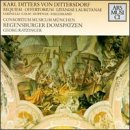| All Artists: Karl Ditters von Dittersdorf, Georg Ratzinger, Consortium Musicum Munich, Nikolaus Hillebrand, Regensburger Domspatzen, Hanna Farinelli, Heiner Hopfner, Birgit Calm Title: Karl Ditters von Dittersdorf: Sacred Music - Requiem; Offertorium; Litaniae Lauretanae Members Wishing: 1 Total Copies: 0 Label: Ars Musici Release Date: 4/16/1996 Genre: Classical Styles: Opera & Classical Vocal, Historical Periods, Classical (c.1770-1830), Early Music Number of Discs: 1 SwapaCD Credits: 1 UPCs: 789368350827, 4017563115825 |
Search - Karl Ditters von Dittersdorf, Georg Ratzinger, Consortium Musicum Munich :: Karl Ditters von Dittersdorf: Sacred Music - Requiem; Offertorium; Litaniae Lauretanae
CD Details |
CD ReviewsObviously Rococo Leslie Richford | Selsingen, Lower Saxony | 03/13/2007 (4 out of 5 stars) "Karl Ditters von Dittersdorf (1739 - 1799): Sacred Music. Requiem in C Minor; Offertory in Honor of Saint John of Nepomuk; Lauretanian Litany in D Major. Performed by Hanna Farinelli, soprano; Birgit Calm, alto; Heiner Hopfner, tenor; Nikolaus Hillebrand, bass; The Regensburger Domspatzen (Boys' Choir of Regensburg Cathedral); Consortium Musicum Munich; directed by Georg Ratzinger. Recorded in July 1986 at the Niedermünster Church in Regensburg, Bavaria (Germany) by the Bayerische Rundfunk (Radio Bavaria). First issued in 1987 and re-released in 1996 by Freiburger Musik Forum on its Ars Musici label AM 1158-2. Total time: 62'42".
For those who may have been attracted to this page by the name Ratzinger, I should perhaps immediately point out that the musical director of this CD is the elder brother of the current Pope Benedict (Joseph Ratzinger). Georg Ratzinger was musical director at the Roman Catholic cathedral in Regensburg for some 30 years until his retirement in 1994 and was, until recently, probably better known than his younger brother, at least in Germany. Georg Ratzinger's particular service to music appears to have been in the brilliant leadership given to the "Regensburger Domspatzen", certainly the oldest existing boys' choir anywhere in the world (it was founded over 1000 years ago!) and still today one of the top three boys' choirs in the German-speaking lands. The Dittersdorf CD presented here by Ars Musici represents a seemingly quite complicated piece of collaboration between various musicologists interested in restoring the reputation of the composer Karl Ditters [von Dittersdorf being a later title added at the behest of the Austrian Emperor]. Dittersdorf was one of the most popular composers in the Austrian Empire during the second half of the 18th century. His stage works were performed in Vienna and rivalled or even excelled those of Mozart with regard to their popularity. Dittersdorf spent most of his life in rural Silesia (today part of Poland), but he also made frequent visits to his birthplace, Vienna, where he was a close associate of both Haydn and Mozart, with whom he occasionally played in a string quartet (together with Johann Baptist Vanhal, another almost-forgotten composer from this period). Although Dittersdorf appears to have concentrated mainly on writing symphonies (a number of which have been recently performed and published by the Naxos label in its series on the 18th Century Symphony), he also wrote sacred music as part of his duties as "kapellmeister" to the Prince Bishop of Breslau. These pieces have only survived in manuscript part copies kept until today in Silesian libraries, and the artists involved here deserve great praise for their diligence in finding these out and restoring them. Although Dittersdorf's music today sounds obviously "rococo", occasionally reminding one of Haydn and definitely lacking the genius of Mozart in his unfinished Requiem, the pieces collected here are well worth the hearing, their combination of choral splendor, solo arias and a festive orchestral accompaniment including trumpets, trombones and drums providing not only "spiritual entertainment" but also giving evidence of the high musical standard to be found even in somewhat remote parts of Europe during the Revolutionary period. The performance by the Regensburg team is excellent. The booklet, unfortunately, does not give very many details; I suspect that the Munich Consortium musicum may have been playing on modern instruments, but their playing is so stylish that the question of periodicity never really intrudes itself. I have never come across any of the soloists anywhere else, but they seem to me to do all that could be expected of them, with only Hanna Farinelli occasionally raising an eyebrow, her pronunciation not always being a hundred percent clear and her timbre needing a little getting used to (although that may be because, as a dyed-in-the-wool early music fan I had mental images of her famous early 18th century castrato namesake). The Regensburger Domspatzen appear to have consisted of at least 24 boys, whom the engineers have kept as a block in the background - despite the emphasis on their participation on the cover, it is mostly the soloists to whose one attention is directed. All in all, a worthy recording, giving a good impression of both Dittersdorf and of some of Bavaria's leading musicians." |


 Track Listings (18) - Disc #1
Track Listings (18) - Disc #1